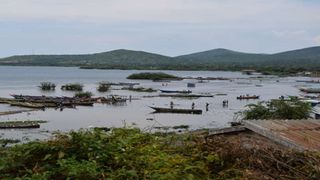
Wadiang’a beach in Sindo, Homa Bay County.
News
Premium
Why Lake Victoria fish are dying
What you need to know:
- Villagers speculated that the fish were dying due to poisoning or a sudden rise in water temperatures.
But yesterday, Kenyan experts downplayed the deaths and ruled out poisoning.
On Tuesday last week, William Onditu woke up early as usual, armed himself with nets and headed to Kiwa Beach to catch fish.
On arrival, he was pleasantly surprised that the fish they catch in Lake Victoria had decided to leave the waters for land. His colleagues were scrambling to collect the beached Nile Perch, Tilapia and omena.
“Some fish were dead while others were still alive,” he told the Nation yesterday. “It is a phenomenon that is common along the shores of the lake in areas where rivers drain their waters.”
Homa Bay County Beach Management Unit Chairman Edward Oremo confirmed the incident, adding that the fish “were very few and so fishermen were not much concerned.”
“We are, however, taking the matter seriously and working with relevant authorities on how to address the issue,” he said.
500 fish
While the beaching of the more than 500 fish at Kiwa and Nyandiwa beaches in Suba Sub-county might seem ordinary to Mr Oremo, Mr Onditu and other fishermen, the Tuesday occurrence was not normal.
Hundreds of fish were similarly found either beached or floating on water at Gerenge and Kigungu landing sites in Entebbe, Wakiso District, Uganda.
Local fishermen had reported that, although fish deaths were a normal occurrence for them, the latest incident was a puzzle as it affected both old and young Nile Perch, according to Uganda’s Ministry of Agriculture, Animal Husbandry and Fisheries.
And at Philomena landing site in Mwanza, Tanzania, Mr James Rukas, a local fisherman, told journalists that fish that appeared “drunk” were swimming close to the water surface but were not dead.
This means the hitherto unexplained phenomenon that caused panic across the region affected the entire lake and its outlets, including River Nile.
Villagers speculated that the fish were dying due to poisoning or a sudden rise in water temperatures. But yesterday, Kenyan experts downplayed the deaths and ruled out poisoning.
“It is nothing of concern. About 200kg of fish (about 500 pieces) suffocated due to a drop in oxygen levels,” said Dr Chrispine Nyamweya, the Kenya Marine and Fisheries Research Institute (Kemfri) director in charge of inland fishing and limnology.
Kemfri said this normally happens during high tides and strong winds, when there is water exchange. Homa Bay County director of fisheries George Okoth said the fish might have died after suffocation caused by recent strong currents in the lake.
Difficulties breathing
He said fish have difficulties breathing when the waves are strong.
“Waves flow to the beach, so after the fish dies due to suffocation in the middle of the lake, it will be swept onto the shore,” said the marine expert. His assistant Michael Omondi added that fish could have died due to limited oxygen. He said the lake has layers where the level of oxygen differs. There is more oxygen on the top than the bottom.
“Sometimes water from the top layer is mixed with the one in the bottom which affects the level of oxygen concentration in water. This happens when rivers flow very fast into the lake causing water to stir up,” he explained.
Kenya’s Kiwa and Nyandiwa are located in an area where River Migori and River Kuja drain their waters into Lake Victoria. Unlike catfish, Nile Perch is known to be sensitive to low oxygen levels— below two milligrams per litre.
In Uganda, the authorities have also ruled out poisoning following preliminary investigations into the deaths reported in lakes Victoria and Kyoga and River Nile, stating the deaths could have been caused by upwelling).
It is suspected that the recent storms on the lakes caused mixing of the different waters— thereby reducing the oxygen levels in the lake. Lake upwelling is the movement of poorly oxygenated water from the bottom to the top. The process causes mixing of water resulting in the suffocation of fish due lack of oxygen.
Kenyan experts told the Nation that upwelling is common in October and November.
But with the change in the weather patterns, Kemfri assistant director in charge of fresh water systems Christopher Aura said there could be fresh upwelling in the lake. According Dr Aura, eutrophication and decomposition of water hyacinth are among other factors that can lead to suffocation of fish.
Eutrophication happens when the nutrient content in water is beyond normal. This is common when water plants such as water hyacinth start decomposing.
In May 2020, Lake Victoria levels recorded 13.42 metres, surpassing the highest recorded level at13. 41 meters in May 1964.
The occurrence caused massive flooding as the lake waters broke their banks, displacing hundreds of families and businesses near the shores.






